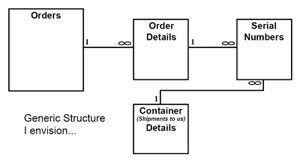RickDB
Registered User.
- Local time
- Today, 05:10
- Joined
- Jun 29, 2006
- Messages
- 101
My database uses a common structure (from what I understand):
tblCustomers
tblOrders
tblOrderDetails
so, when an item is entered in, the following is recorded (the field names may not be right, but you 'll get the effect):
tbOrders:
TaxRate
ShippingCost
tblOrderDetails:
Quantity
ModelName
Price
Calculated totals on the form/reports:
Extension (line price for each order detail)
SubTotal (Sum of Extensions)
Taxes
Total
So I have struggled and finally made this work, but here is the problem:
Say I want to record the serial number for each product sold. What is a good method to do this? Obviously I cannot store it in the OrderDetails table because each line/entry could account for any quantity of that model.
I know a one to many is required, has anyone done this before and can you spare some advice? I want to make sure I get the structure right because I will have to alter a significant amount of my database to implement this feature.
Thank you!!!!
tblCustomers
tblOrders
tblOrderDetails
so, when an item is entered in, the following is recorded (the field names may not be right, but you 'll get the effect):
tbOrders:
TaxRate
ShippingCost
tblOrderDetails:
Quantity
ModelName
Price
Calculated totals on the form/reports:
Extension (line price for each order detail)
SubTotal (Sum of Extensions)
Taxes
Total
So I have struggled and finally made this work, but here is the problem:
Say I want to record the serial number for each product sold. What is a good method to do this? Obviously I cannot store it in the OrderDetails table because each line/entry could account for any quantity of that model.
I know a one to many is required, has anyone done this before and can you spare some advice? I want to make sure I get the structure right because I will have to alter a significant amount of my database to implement this feature.
Thank you!!!!

